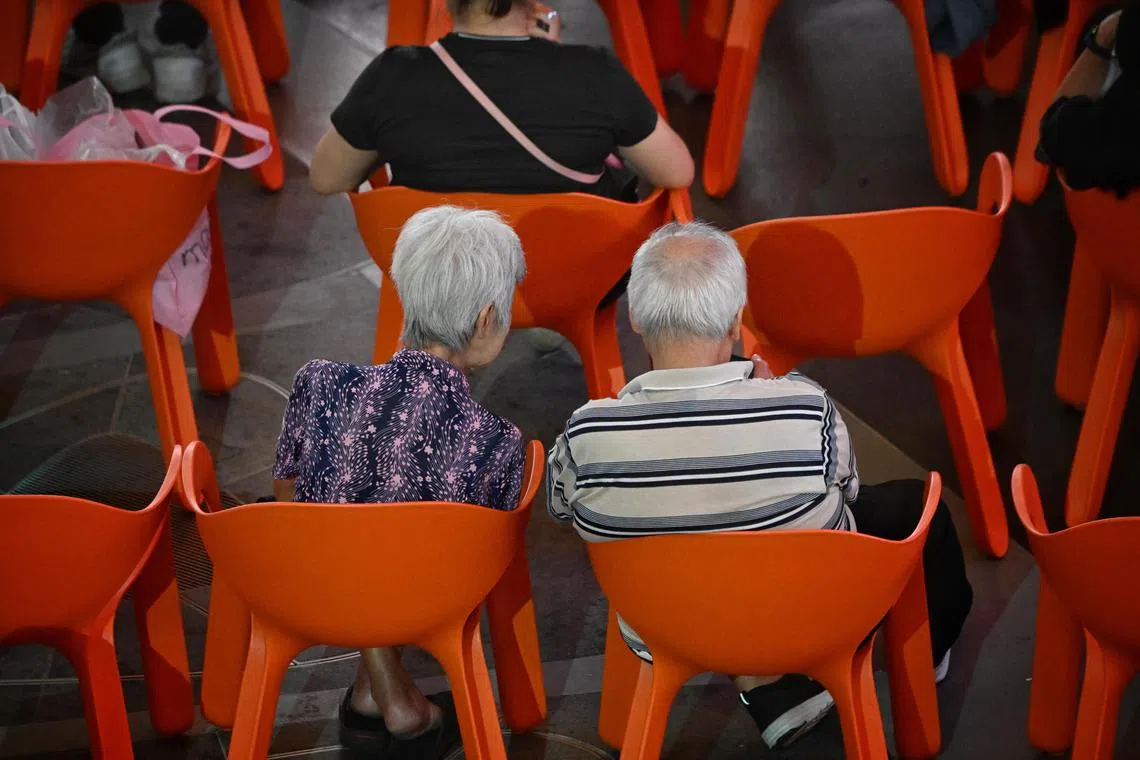When grandpa can’t find his way home: How to help those with dementia
Sign up now: Get ST's newsletters delivered to your inbox

Dementia Singapore said the risk of going missing increases based on the severity of the person’s condition.
ST PHOTO: ARIFFIN JAMAR
SINGAPORE - Not all of the elderly who go missing have dementia, but it can be reasonably deduced that the condition is a significant contributing factor, said doctors whom The Straits Times spoke to.
Dementia Singapore, a social service agency for dementia, said the risk of going missing increases based on the severity of the person’s condition.
Its spokesman said: “For someone with mild or early-stage dementia, they may be still able to recognise places. So they may get confused sometimes, but not entirely lost.”
In a February 2022 parliamentary reply on missing-person cases, Law and Home Affairs Minister K. Shanmugam said about 15 per cent of the 5,072 missing people reported to the police from 2019 to 2021 were vulnerable people, such as young children and the elderly.
There were 154 cases of missing people aged 61 and above in 2019, 129 in 2020, and 127 in 2021.
A key factor that led to the drop in numbers in 2020 and 2021 were restrictions on movement during the Covid-19 lockdown. This meant that most of the elderly did not wander out of their homes.
But the isolation might have actually worsened things for those with dementia, said the spokesman for Dementia Singapore.
He said: “Safe distancing measures over the past two years meant that persons with dementia and the elderly were encouraged to stay at home more, or avoid contact with too many people. Changes to their daily routines became unavoidable.
“They were unable to go out to meet their friends at the coffee shop, attend daycare centres or have meals with their extended family members. It was and still is stifling for persons with dementia, who need that social and mental interaction even more than others.”
This can lead to an increase in symptoms like confusion about places and time, and being unable to retrace their steps. The elderly may also wander outdoors due to the distress caused by social isolation and other Covid-19 stressors, he added.
Despite surveys such as the Well-being of Singapore Elderly study conducted by the Institute of Mental Health in 2013, data on dementia in Singapore remains limited. A second study is under way.
The 2013 study found that one in 10 adults here aged 60 and above had dementia.
About 28,000 people aged 60 and older had dementia in 2012, and this number is expected to soar to 80,000 by 2030.
Dr Philip Yap, a senior consultant in geriatric medicine at Khoo Teck Puat Hospital, said the country can anticipate more of its elderly being unable to find their way home in the years to come.
The number of people with dementia, he said, is also set to rise in tandem with the increase in the proportion of elderly folk.
Here are some ways to help those with dementia, according to social workers and doctors:
If the person with dementia needs constant support
Always assign an extra pair of eyes to observe these individuals. This could be a domestic helper, or family members on a rotated schedule.
Family members and caregivers can observe and keep track of when – during the day or night – they are likely to wander. At those times, try to engage them in meaningful activities to help ease their minds and alleviate their restlessness.
If the person with dementia is able to go out independently
These individuals should carry with them a form of personal identification and the contact details of their next of kin. The information can be contained in a wallet, or engraved on a pendant or wristband.
Ensure that they carry a mobile phone so that they remain contactable. The phone or another device can be subscribed to GPS tracking services to allow others to find them.
Correction note: This article has been updated to correct the spelling of Dr Philip Yap’s name. We are sorry for the error.



